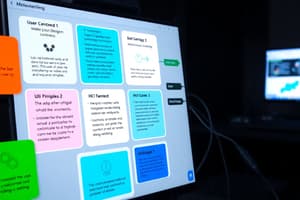Podcast
Questions and Answers
What is the primary focus of Interaction Design (IxD)?
What is the primary focus of Interaction Design (IxD)?
- Speeding up technological advancements
- Creating visually appealing products
- Enhancing usability, accessibility, and desirability (correct)
- Maximizing profits for businesses
Which field is NOT typically integrated into the principles of Interaction Design?
Which field is NOT typically integrated into the principles of Interaction Design?
- Computer Science
- Psychology
- Anthropology
- Engineering (correct)
What is a key element of Interaction Design that focuses on organizing content and creating a clear structure for users?
What is a key element of Interaction Design that focuses on organizing content and creating a clear structure for users?
- Interaction principles
- Information architecture (correct)
- User-centered design
- Visual design
Which principle guides how users interact with digital products by ensuring consistency, feedback, simplicity, and affordance?
Which principle guides how users interact with digital products by ensuring consistency, feedback, simplicity, and affordance?
Why is visual design considered crucial in Interaction Design?
Why is visual design considered crucial in Interaction Design?
Which stage is typically part of the structured process in Interaction Design projects?
Which stage is typically part of the structured process in Interaction Design projects?
What is the correct order of the steps in the design process according to the text?
What is the correct order of the steps in the design process according to the text?
Which design pattern is described as a three-line icon that reveals a hidden menu when pressed?
Which design pattern is described as a three-line icon that reveals a hidden menu when pressed?
What is the main focus of Interaction Design?
What is the main focus of Interaction Design?
What role does Accessibility play in Interaction Design?
What role does Accessibility play in Interaction Design?
Who are often part of interdisciplinary teams that Interaction Designers work with?
Who are often part of interdisciplinary teams that Interaction Designers work with?
What aspect is essential for creating meaningful and engaging experiences in interaction design?
What aspect is essential for creating meaningful and engaging experiences in interaction design?
Flashcards are hidden until you start studying
Study Notes
Unlocking the Art of Interaction Design
Interaction design (IxD) is a multidisciplinary approach that focuses on enhancing the usability, accessibility, and desirability of products, services, and environments by creating intuitive and enjoyable experiences for users. It's about more than just making things look good; it's about understanding how people interact with technology and designing systems that fulfill their needs and desires.
Fundamentals of Interaction Design
At its core, interaction design combines principles from psychology, anthropology, computer science, and other fields to create meaningful, functional, and engaging experiences. The key elements of IxD include:
- User-centered design - This approach puts the user at the center of the design process, ensuring their needs and desires are prioritized throughout.
- Interaction principles - These are fundamental rules that govern how users interact with digital products. They include consistency, feedback, simplicity, and affordance.
- Information architecture - This aspect of IxD focuses on organizing content and creating a clear, navigable structure for users.
- Visual design - While not the only aspect of interaction design, visual design plays a crucial role in creating an engaging and aesthetically pleasing user experience.
The Design Process
Interaction design projects typically follow a structured process, often incorporating the following stages:
- Research: Understanding the user, their needs, and their context is essential for creating a successful design.
- Define: Identify the problem and clarify the project goals.
- Ideate: Brainstorm potential solutions to the design problem.
- Prototype: Create low-fidelity mock-ups of possible solutions.
- Test: Gather user feedback and iterate on the design based on the results.
- Implement: Integrate the design into the final product or service.
Design Patterns and Libraries
Interaction design relies on the use of design patterns and libraries to create consistent, predictable, and intuitive experiences. Some of the most popular design patterns include:
- Hamburger Menu: A three-line icon that reveals a hidden menu when pressed.
- Card Layout: A grid of content that is easy to scan and navigate.
- Swipe Gesture: A motion-based interaction that allows users to navigate through content.
Accessibility and Inclusivity
Interaction design must consider the needs and limitations of users with disabilities. By following accessibility guidelines and incorporating inclusive design principles, IxD can create more equitable and accessible experiences for all users.
The Role of Interaction Designers
Interaction designers are responsible for creating, refining, and validating user experiences across a wide range of digital products and services. They often work in interdisciplinary teams that include product managers, developers, and visual designers.
Conclusion
Interaction design is a dynamic and evolving field that requires a deep understanding of human behavior, technology, and design principles. By putting users at the center of the design process, interaction designers can create meaningful, functional, and engaging experiences that meet the needs and desires of their target audience. Whether you're a designer, developer, or product manager, understanding the principles and practices of interaction design can help you create better products and services that deliver exceptional experiences.
Studying That Suits You
Use AI to generate personalized quizzes and flashcards to suit your learning preferences.




